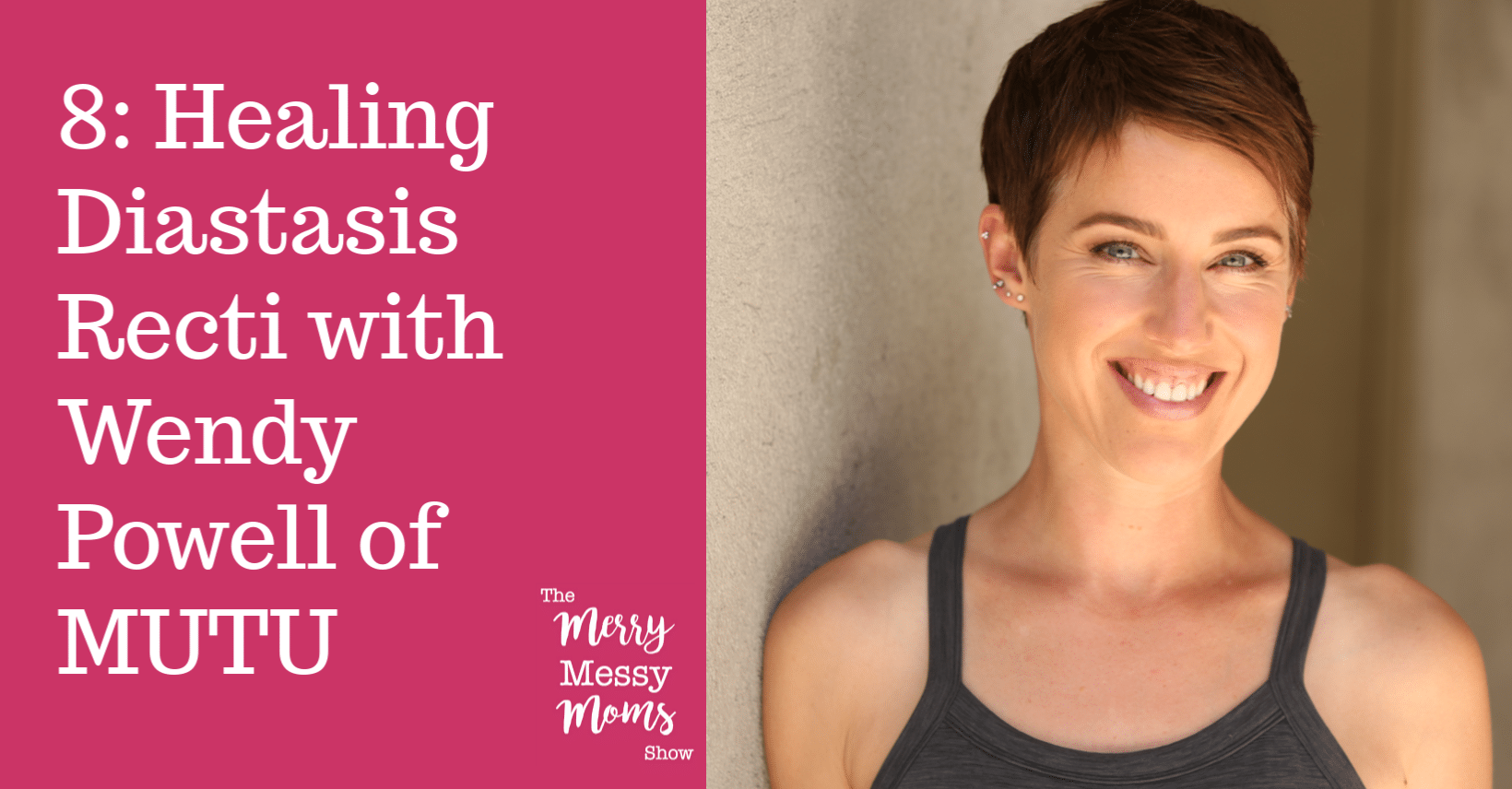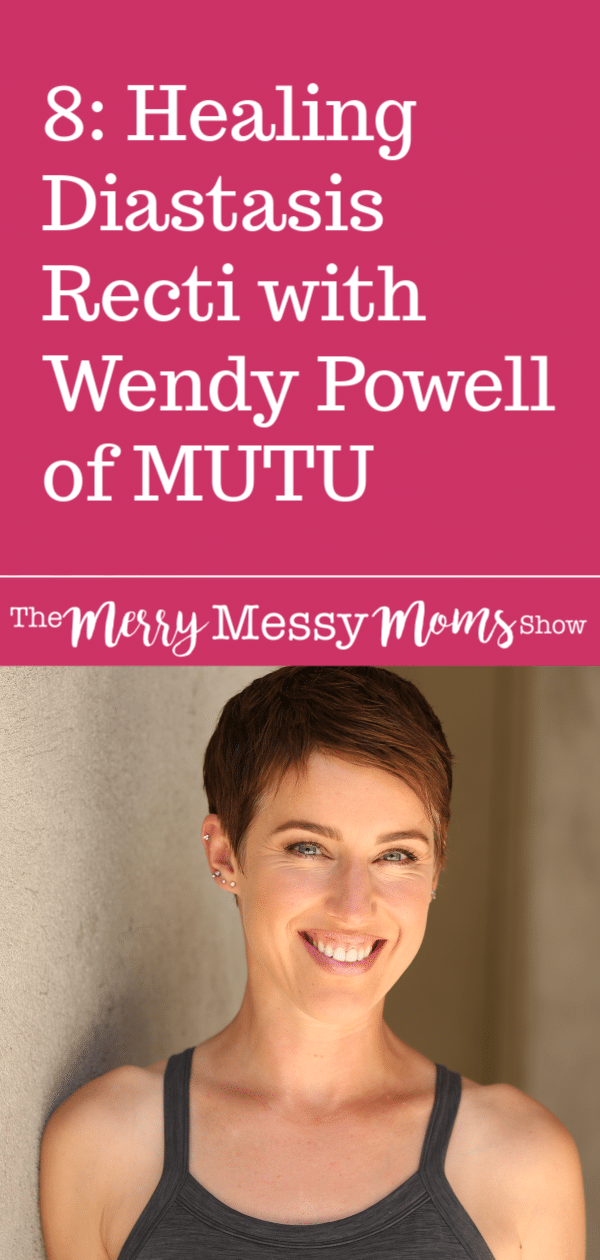8: Healing Diastasis Recti after Babies with Wendy Powell of MUTU
After giving birth, many of us mothers are left with bodies we barely recognize. Bulging bellies, leaking pee when we run or jump, and back pain. This is all the cause of what's called Diastasis Recti, which refers to a separation in the abdominal muscles that doesn't always go back after giving birth. In this episode, I interview Wendy Powell, the founder of MUTUsystem.com, which is an exercise and body confidence program that helps women heal their bodies and minds after giving birth.
 Episode Recap
Episode Recap
When it comes to giving birth, some mothers have wonderful birthing experiences, where things go mostly as planned and the outcome is good. For others, many things go wrong and that can leave a mother feeling like her body failed her, or that she somehow failed to do the job right. Then we go into postpartum recovery equipped with very little information on how to find our confidence, strength and dignity again while we wrestle with a body that has a bulging belly, leaks pee when we run or jump, has back pain, stretch marks and extra weight. It can feel like you have nothing of your own anymore as you sacrifice everything for this new baby.
The wonderful thing is that it doesn't have to be this way and trailblazers like Wendy Powell of Mutusystem.com are empowering women all over the world to know their own strength, beauty and power and restore their pelvic floor function after giving birth. I have used her program myself and it helped to not only heal my back pain and restore my core muscles and control, it helped to change my mindset and outlook on health and fitness.
In this episode, we talk about her program and what it entails, and the story of how she created it in the first place, from going through two very traumatic deliveries herself to getting her power back and owning a successful exercise program.
Links from This Episode
- Go straight to the MuTu program
- My story with the MuTu program
- My Almost Natural, Quite Traumatic Birth Story
- My 15 min arm workout
- Last week's episode – How to Fit in Exercise as a Mom and Actually Stick to It
Listen Here!
Wendy's Bio
Wendy Powell is a globally recognized leading voice on body confidence and body positivity. Author, international speaker, award winning entrepreneur and certified exercise specialist, she is founder and CEO of world best-selling postpartum recovery program, MUTU® System and accredited education provider MUTU Pro.
Wendy’s work is grounded in her belief that ‘every woman deserves the dignity of a body that works and that makes her feel good’. Her technical expertise, engaging coaching and evidence-based practical strategies ensure that true body confidence is an achievable reality.
MUTU System is an award-winning restorative online exercise program and thriving community of more than 41,000 women worldwide and is medically recommended by respected women’s pelvic health specialists.
Featured on:
CNN.com | Fox News Health | Parents.com | Mail Online | Mother & Baby and many more.
Episode Transcript
Wendy's honored that her program, MuTu, has gotten to where it is now – tens of thousands of women have really raised the bar and their expectations of how their body should work and feel after having babies.
“It's about confidence and it's about dignity. We start there with MuTu. We start with function and dignity. I don't care what you look like in skinny jeans, if you're leaking, you're not feeling good.”
“The aesthetics are the bonus – I strongly believe that every women deserves to have a body that works and that makes her feel good.”
How Wendy Got Started
About 12 years ago, she started as a personal trainer in London. She was in demand, super fit, and looked the part. She now refers to that time of her life as the “self righteous personal trainer.”
You know, if you just drink kale every day, everything will be fine!
She was actually already a specialist in pre and post natal work, had the certification for it and understood the theory.
So she would go to her clients' houses, moms who were sleep deprived, and she'd be all well rested, trim and energized. One of her clients called her out on it – “you've never had babies, have you?”
Her's was one of the few jobs that you can actually get better at after having babies!
Giving Birth Herself Changed Everything She Knew About Fitness
When Wendy had her first baby, a girl, all of her theory and training went out the window. Even though she was in great physical shape and had been eating well, the labor and delivery were really tough. She ended up hemorrhaging massively and it was quite a traumatic experience.
We're always told, well at least you have your healthy baby! But she felt physically broken by it. She felt betrayed by her body – this isn't fair. She felt bitter – I did everything right, why didn't I get the birth that I wanted?
And we all can feel this way when the birth experience doesn't go like we want it to. Like our bodies failed us and didn't do what they were supposed to do. Like we didn't perform well enough.
She had another traumatic birth with her second child 2 years later
Same thing happened two years later – it was so bad that it happened at home and she was helicoptered to the hospital. Her son was only an hour old and her husband had to drive him to the hospital wondering if she was even going to be alive when they got there.
The combination of the two experiences left her feeling like she'd failed. She was ashamed, mad and disappointed of her body. It hadn't done what it was supposed to do. She felt disempowered, out of control, as many mom can relate to.
It's Not Actually About Fitness
As the months went on after her second child, she began to exercise again and realized it wasn't actually about exercise. It wasn't about finding muscles and fixing them. It was about reframing about how we think about our bodies.
“I feel like when we give birth, we should feel the most amazing, strong, feminine, awesome and incredible of our lives. And we don't – we feel like we don't look good and get undressed in the dark and feel like rubbish.”
She wanted to change that and knew that the fitness industry was not serving women at all. It's all about getting strong and bouncing back, but she realized there was this huge missing piece in postpartum recovery for women.
“There was this huge missing part of the puzzle which was about getting our love for our body back, getting our confidence back, and getting our function and connection back.”
We cut ourselves off from the parts of our bodies that we don't like and it's very hard to fix something in our bodies that we've stopped talking to.
Like when you go for your pap smear we lie there and try to go to our happy place and ignore what's going on. We end up doing this for years with parts of our bodies that we don't like.
Our bodies are totally different after giving birth
Nothing about our bodies is the same after pregnancy and birth. The tummy, pelvis, pelvic floor – nothing looks like it used to or feels like it used to.
And if were were someone who used to exercise, the things you used to do to get results doesn't get results anymore.
It adds to that feeling of disempowerment and lack of control. Like our bodies aren't our own anymore.
So what often happens is either we try to cover it up and ignore it, or we do exercise but it's not to nurture our bodies, it's to punish them.
Like, I will run. Even though I'm leaking, and my tummy feels like it's falling out and I'm hurting, I will run because when I run I feel in control. But you're not – if your body is leaking or your belly is bulging, it's your body trying to tell you loud and clear that it's not ready to do that right now.
“And as a culture, we've gotten to this place where we ignore even when our bodies yell at us, we ignore it. There are women running, but they're wearing pads.”
They're punishing the body that didn't perform. They're trying to beat it into submission almost.
So instead, come back to, this body has done amazing things and it needs to heal.
So it's not that you can't eventually do running, and crossfit and high impact workouts, but the pelvic floor needs to be restored and healed first to build that foundation so the body functions properly.
If your body is still leaking when you jump on a trampoline or run, it hasn't healed – you're still postpartum.
It's Never Too Late to Start
The great thing about getting the strength back in your core, abs, and pelvic floor is that it's never too late. Even if you had kids 20 years ago, her program can still help you heal your relationship with your body and get strong again.
She teaches more than exercises – she teaches you the body mechanics
She loves to teach women not just exercises to do, but to explain why you're leaking pee when you run, and why you're having difficulty enjoying sex and why your stomach bulges out and you still look slightly pregnant.
One of the questions she's asked the most is when can I get back to…running, rowing, dance, aerobics, crossfit, etc. Your body will tell you can get back to it and here's how it does that. It doesn't matter what the activity is, what you need to be able to understand the signs and know your own body well enough to know that it's healed.
It's Not About Trying to Get Your Body Back
Once we become moms, we are really different people. Stronger, more confident, more compassionate. Motherhood grows us in so many wonderful ways! So why do we keep talking about trying to get our bodies back? We are different people now. Let's start talking about bouncing forward and change the mindset. It's impossible to get our lives our bodies back that we had in the past and we'll be miserable if we try.
And it's not to say that we can no longer be all of those that we want – energetic, sexy, powerful. But it's getting away from this bizarre obsession with looking younger and going back.
Connecting to Your Pelvic Floor
Wendy's program does such a good job of training your brain to recognize and feel the pelvic floor muscles and then to learn how to contract and release them. Many of those muscles are permanently tight and have to be relaxed in order to grow stronger and to work.
Having tight pelvic floor muscles, or hypertonic pelvic floor, can actually lead to urge incontinence. So when do you have to go to the bathroom, it's urgent. There's no off switch – it's on and it's intense.
For example, if your bicep is always clenched, when you go to actually pick something up, it's already being used to it's full potential, so it can't expand anymore. It can't do it's job.
All About Distasis Recti
This refers to a widening of the gap between the rectus muscle at the front of your abdomen. From breastbone to pelvic bone. These sets of muscles, which are known as the six-pack, are joined by a connective layer of tissue.
These two muscles part when we are pregnant and the connective tissue gets thinner and stretches, which is exactly what it's supposed to do to make room for a baby.
It's not a problem unless the muscles stay separated long after giving birth. For most women, the gap remains. It's usually measured in finger widths, which is subjective since we all have different sized finders. But a normal gap after pregnancy is a 2-4 finger gap.
It can much more easily heal when your body has proper alignment – the way we sit, stand and walk affects our alignment. This is why MuTu is a whole body program. It's not about doing an exercise to fix a muscle. The whole body must be address to fix and heal the gap.
How do you know if you still have the gap?
- Feeling of instability – like your belly is falling out
- Back pain
- Still looking pregnant
- Difficulty having intercourse (painful or not able to squeeze down)
- Leaking pee when you run and jump
So this program realigns the body so it can be in a position to heal.
It's all well and good if you can get your core to work when you're lying on your back doing crunches, but it's another when you're holding your baby on one hip, with your keys in the other hand, and kicking the door shut with your leg. Is your core supporting your back and body then?
Pelvic Health is For Life
It's more about the lifestyle. Wendy goes back and does the program herself now and then even though she's 10 years postpartum. Pelvic health is for life – it's maintenance. It's like brushing your teeth – you don't brush them once really well and then never do it again.
Sticking to the program is easy when your mindset is in the right place
When you see exercise and this program as a way to treat yourself, to give back to yourself, that you deserve that time, and to honor your body for the amazing job it it growing a baby, it's easier to do the daily exercises. Because it only takes 10 minutes. And as moms, we are always serving others. It's about serving ourselves for those 10 minutes.
When you think of it as another thing you have to do on your to-do list, it's much harder to stick to it.
We can be so critical and harsh on ourselves, and this is the time to start letting that go. Whether you do the exercises daily or try and fit them in as you can – both are good. Both work – making it work well for you is what's important. Knowing that you can't get it wrong, you can't fail.
Move for the sake of Moving
The MuTu program is about building a foundation in your body so that you can then do the activities that you love and enjoy moving your body. When we do it from a place of punishment, it's so difficult to stick to any kind of exercise at all. It's not about accomplishing 30 sit-ups, or doing planks for 2 minutes. It's about moving and having a body that works and functions properly.
It's as if we're told after having babies, this is your lot now. You'll forever look like you are pregnant. You'll never get your pelvic floor function back. Deal with it. Because we had the audacity to have babies that we have to accept that this is how it is now.
And it isn't about aesthetics, or being hot, it's about dignity and feeling good and proud of yourself. And peeing on yourself never feels dignified.



